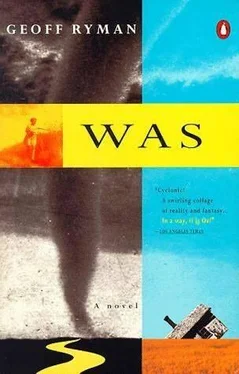"That was a right smart supper, Dodo, thank you," said Aunty Em, with a smile. The only thing Dorothy knew about dodos was that they were extinct.
"Don't you worry about the washing-up," said Aunty Em. "You just get on with your home studies. Henry, please could we clear a space for Dodo's books?"
Henry said nothing, but stood up and went out into the night.
Aunty Em looked at Dorothy, smiling crookedly. "I surely hope he manages to produce something tonight."
They were all bound up tighter than drums with pork and no vegetables. Aunty Em's face was kind. It was taking Dorothy into her confidence, as if she were almost an adult. This confused Dorothy mightily. No! she thought. It's too soon for that. She didn't want to be treated like an adult. She wanted to be treated like a child. She wanted to be sat on someone's knee and be told a story; she wanted to sit on someone's knee and do nothing, leave the work behind.
"Dorothy," chuckled Aunty Em. "No need to be shocked, child, there are some things that are perfectly natural to talk about sometimes." She stroked Dorothy's hair with fondness.
"Now you get settled in," said Em with a sigh, and stood up and collected the dishes with a fine clattering of clay.
The next morning Henry got up and gave her a ride in to school, and neither of them mentioned that he had left her alone, waiting at the bridge. They sat coldly side by side but at a distance. He did not even ask her how she had found her way home.
Dorothy passed the day at school in even deeper silence than usual, hugging the books that she yearned to lose forever.
In the afternoon, she walked back down Poyntz and along the road toward the bridge. She had made plans. If Henry was not there, she would slip back into the school and sleep by one of the stoves. But Uncle Henry was there, blue in the dusk, waiting for her, holding the horse's lead.
And that night, as he led the horse and the cart toward the barn, he grabbed her wrist, and pulled her with him. Inside the barn, he held her to him and blurted out a kind of a sob. He rested his shaggy, smelly head on her shoulder and neck, and his cheeks were damp and he pressed her to him.
He did love her after all. Dorothy went weak from gratitude. She hugged him back, and his huge, rough hands pushed her even closer to him. The whole length of his body was against her, and he kissed her cheek. Was he saying he was sorry? He must be. Dorothy kissed him back. She meant to kiss him on the cheek, but he turned his head and their mouths met. That startled Dorothy and she jumped back. He worked her shoulder, and his smile crumpled and went grim. He turned away, and Dorothy wondered again if she had done wrong.
The next day, the ride was joyful. Uncle Henry sang old campfire songs. Dorothy had never seen him like that. She giggled and he turned his eyes toward her and they had a sparkle she had never seen before. It suddenly occurred to her that Uncle Henry had once been young. He would have been a young, broad-shouldered man with sparkling eyes. And bad teeth.
So when did it begin? Every evening in the barn, or sometimes in the woods, when it was dark, he would pull the wagon to a stop, and hidden under lap robes, he would tickle her. Dorothy was getting bored with being prodded and tickled. Henry kept looking back and forth up the road as if it were something naughty, something bad. She pitied him. Poor Henry, old Henry, she thought, and she hugged him. Was that bad? He was just hugging her, and he loved her, so was it bad?
His hands were blunt and large and rough. They kept rubbing her shoulders. When did they begin to rub her legs?
She remembered him cupping both her tiny breasts in his hands. "Pretty little things," he had said, forlornly. Even then, Dorothy was not sure that it was bad. He looked into her eyes. His eyes were blue and large, cold and soft at the same time, and his cheeks were always bright red on deep brown and covered with tiny purple veins all over the surface. He looked lost.
"Do you like it when I touch you there?" he asked.
She didn't like it, not really at all. It was private and it wasn't nice, but he was Henry and he loved her.
"You're so kind, Dorothy. You're so good to old Henry."
One evening in the barn, his trousers came down, and she saw his thing, and she knew then that this was bad.
"No, honey, no, Dorothy, don't look away, don't look away from old Henry. Here, look, I put it away, see?"
The only thing that Dorothy had thought was good about her life was bad. All her life was bad; it was something to do with her. She must be bad, if this was what happened. The thought of her badness made her go still. It must have made him go still too.
He didn't do it right away. He tried to hold off. But it was too much for him, alone with the flat wilderness, his drying fields, and Em.
Finally he did it, quickly, in the barn, while Em sat with her books The thought of her own badness made Dorothy go small and still, Dorothy looked at the straw and the wooden beams and knew that everything would change. When he was done, he was scared. He pulled up his trousers and began to weep. "Oh God, oh salvation. There's no praying that can heal this."
She knew it was truly terrible then. Dorothy watched, as if pork were frying. He did not look at her. He will hate me now, she knew. She was ready. It was all she deserved. There was more blood. More bad blood. She was so full of that bad blood, it just oozed out of her.
"You better get into the house," he murmured, looking away from her.
That night at dinner there was a terrible silence. Even Em could sense it. She was full of rage. It was Aunty Em's turn to cook and she banged down the plates and the coffeepot. She had boiled up some jerky and some dried corn and that was all they had to eat. Dorothy thought she must have seen them, that she must know. The silence was terrible, but Em did not notice anything unusual. For Em, the silence was always there, and always terrible. Em was oblivious to her own rage, but Dorothy ate in suspense. Later, Dorothy went out into the darkness and threw up, quietly, so Em couldn't hear. There is no pit, Dorothy thought, no hole in the ground deep enough and black enough to cover me. There was a hook on which they hung the bodies of the hogs. It went right up through their guts. Dorothy thought of putting the hook through herself.
Once again, Henry did not come for her after school. Dorothy had known that he would not. He'll be scared, she thought, beginning to feel contempt for him. He'll keep well away. He might be so scared, he won't do it again. Either way, she knew she could no longer count on Henry for anything. He might send her away. He might want to keep her near and do it again. He might ignore her and pretend that nothing had happened. There was nothing good that either one of them could do. She hitched a ride home with Max Jewell. He had grown up nice and polite and was very interested in Dorothy. He asked her all sorts of questions about Manhattan and tried to catch her eye. Dorothy saw Uncle Henry in him and answered coldly, yes or no.
It took a week. Uncle Henry let other people take her back home for a whole week. Neither one of them said anything to Aunty Em.
Max had found repeated excuses to come out to town, in order to give her a lift back. That in itself was ominous. It might be good to discourage Max.
Finally Uncle Henry showed up, waiting at the bridge. Max was there too. Max called hello to Henry, somewhat unwillingly, and his quick crumpled smile in Dorothy's direction was one of apology. Max assumed quite rightly that she might not want to ride with some smelly old man.
Dorothy felt herself go into abeyance. She watched herself. What, she wondered, am I going to do? She saw herself climb down from Max's wagon.
Читать дальше












